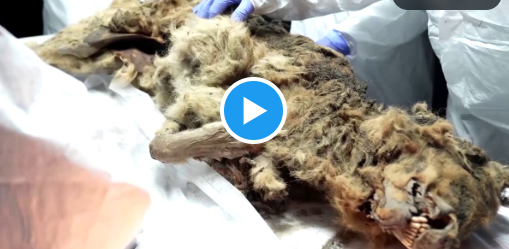I enjoy when scientist find animals that are frozen and in excellent condition from thousands and thousands of years ago. My head immediately thinks of Jurassic Park type of science, even though I know we are still so very far away from such tech.
Russian scientists are conducting an examination on a wolf that has been frozen in permafrost for approximately 44,000 years, marking a unique discovery in the field. The carcass was initially stumbled upon by local residents in Yakutia’s Abyysky district in 2021 and is now undergoing thorough analysis, according to a report by Reuters.
In Russia’s far northeastern Yakutia region, local scientists are performing an autopsy on a wolf frozen in permafrost for around 44,000 years, a find they said was the first of its kind https://t.co/SkXITLWcnr pic.twitter.com/u6fPSG3y1p
— Reuters (@Reuters) June 29, 2024
Albert Protopopov, who heads the Yakutia Academy of Sciences’ mammoth fauna research department, described the find as groundbreaking. “This is the world’s first discovery of a late Pleistocene predator,” he noted, emphasizing its unprecedented nature. The region of Yakutia, situated in Russia’s Arctic far east between the Arctic Ocean, is predominantly characterized by vast expanses of permafrost-covered swamps and forests.
Temperatures during winter in Yakutia can plummet as low as minus 64 degrees Celsius (-83.2 degrees Fahrenheit), preserving ancient animal remains remarkably well. Protopopov highlighted the exceptional aspect of this discovery, stating, “Usually, it’s the herbivorous animals that die, get stuck in swamps, freeze and reach us as a whole. This is the first time when a large carnivore has been found.”
Russian scientists are performing an autopsy on a wolf frozen in permafrost for about 44,000 years, a find they said was the first of its kind.
Found by chance by residents in the far northeastern region of Yakutia’s Abyysky district in 2021, the wolf’s carcass is only now being… pic.twitter.com/1MFThf1kRd
— World Times (@WorldTimesWT) June 28, 2024
The wolf, slightly smaller than cave lions and bears but still a formidable predator, presents a significant opportunity for scientific study. Protopopov described it as an active predator and scavenger, offering insights into the ecological dynamics of the era. The ongoing examination of its remains aims to unravel details about its diet, behavior, and evolutionary context in relation to ancient wolves in Eurasia’s northeastern region.
Artyom Nedoluzhko, development director of the paleogenetics laboratory at the European University in Saint Petersburg, underscored the importance of the find for understanding the ancient environment of Yakutia. “The main goal is to understand what this wolf fed on, who it was, and how it relates to those ancient wolves that inhabited the northeastern part of Eurasia,” he explained, emphasizing the broader implications for paleontological and genetic research.
#VantageOnFirstpost: Here are today’s #VantageShots – images that tell the story | @Alysonle
+ Russia: Scientists conduct autopsy on Permafrost wolf Carcass
+ Paralympic symbol unveiled on Arc de Triomphe
+ On the day: Treaty of Versailles was signed in France pic.twitter.com/XgCSjBuC6E— Firstpost (@firstpost) June 28, 2024
Major Points:
- Russian scientists are studying a 44,000-year-old wolf found frozen in Yakutia’s permafrost.
- This discovery marks the first of its kind, revealing insights into late Pleistocene predators.
- Yakutia, known for extreme cold with temperatures dropping to -64°C, preserved the wolf remarkably well.
- The wolf, a large carnivore slightly smaller than cave lions and bears, was both an active predator and scavenger.
- Researchers aim to understand its diet, behavior, and its place in ancient Eurasian ecosystems through genetic analysis.
Kirk Volo – Reprinted with permission of Whatfinger News



